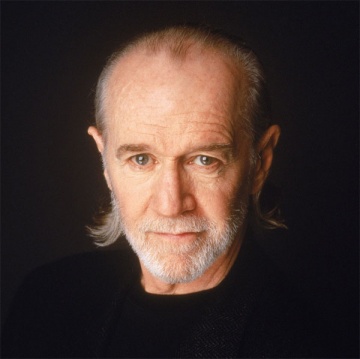Last Splash
In posthumous memoir, George Carlin reveals
artistic and personal struggles that fed his genius.
 George
Carlin’s “Last Words
George
Carlin’s “Last Words ,” published November 10, is a different animal than
his other books of comedic material -- an autobiography compiled over
several years up until his death in June 2008, and finished after that
by his co-author, Tony Hendra.
,” published November 10, is a different animal than
his other books of comedic material -- an autobiography compiled over
several years up until his death in June 2008, and finished after that
by his co-author, Tony Hendra.
Like Carlin’s comedy, this memoir never falls into the traps of the
genre, where the writer can tend to self-aggrandize. Carlin applied his
take-no-prisoners approach to himself in re-telling his life, being
candid about his substance abuse, but more importantly about the fallow
periods in his art and how they eventually drove him to the heights he
ended up reaching.
The first transition in Carlin’s career was his shift from
Catskills-style, Vegas-friendly Ed Sullivan show comedian to hippie,
counterculture critic by the early 1970s. But his less well-known
evolution came after that phase ran its course, as he describes, “In
1975, my fifth Little David album came out. Prior to this, there’d been:
FM & AM -- clear concept; Class Clown -- strong concept, ditto
Occupation: Foole. Toledo Window Box -- no concept, but still a catchy,
snappy name that related to the counterculture. Now along comes … An
Evening with Wally Londo, Featuring Bill Slaszo. … No concept at all. …
Uncertainty. No focus.”
More specifically, Carlin goes on to say, “After an explosion of
self-revelation and self-discovery … I’d become a person fascinated with
his own navel. … I was turning to my bodily functions and extremities
for inspiration.” He then takes his readers along for the ride of his
transformation from self-parody to his resurgence that began with “A
Place for My Stuff,” and evolved through the political and societal
critiques of his albums/HBO specials Playin’ with Your Head, What Am I
Doing in New Jersey?, and Jammin’ in New York.
He sums up the incisive turn his performances took: “It is not
sufficient to have a ‘clever riposte’! A witty song by the Capitol Steps
… doesn’t do it for me. … ‘FUCK YOU, COCKSUCKERS!’ is my approach. To
the world, to the leadership.” Of the landmark piece, “Rockets and
Penises in the Persian Gulf,” Carlin writes, “I think they were
surprised by the sheer performance of it -- it wasn’t quite like
anything I’d ever done. But the combination of laughs and ideas and
imaginative flurries of language overwhelmed any resistance they
might’ve had…”
The 1990s and 2000s were productive years for Carlin, who was touring
right into 2008, performing more than 100 shows in each of most of these
years. And most of the time, those shows were on bare black stages,
where Carlin was usually clad in equally simple black, just the man and
the words he loved. “Last Words” also takes you inside his experience
performing like this, as a “single,” as he puts it -- no supporting
players, no band, no musicians that he had to rely on to help express
himself.
Long before, Carlin reveals, he saw stand-up as a means to an end of
a movie and TV career, but it became the end unto itself. Carlin made
“Last Words” a clear-eyed, unsentimental look at his New York background
and early experiences, including, believe it or not, a stint in the U.S.
Air Force, and how that shaped him. “Last Words” shows the same clarity
in its depictions of Carlin’s creative efforts, notably how he
eventually put himself and his own views into his comedy, fulfilling his
true aspirations. The book is indispensable as a primer for anyone
trying to figure out how to channel themselves into any kind of artistic
endeavor, and be true to themselves as an artist. It’s also a compelling
peek into the mind of one of the top comedians ever and the experiences
that made him tick.
The George Carlin bookshelf:


